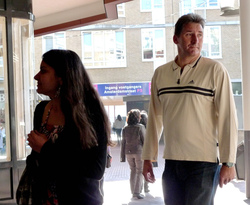
"I came for couples therapy because our relationship is severely threatened!" Many worry that focus on the individual within the couple might mean many troubling things. Does our couples' therapist think I am the problem? Also, if our relationship is in crisis, don't we need to spend every available moment to save the relationship? Won't focusing upon me be more of a selfish than a relational focus? Is our couple's therapist trying to make more money for themselves or for some other colleague, from us?
These are all valid questions that should be answered. There are many other concerns/anxieties that such a referral can bring.
These are all valid questions that should be answered. There are many other concerns/anxieties that such a referral can bring.
While I cannot speak for other marital therapists, I will try answer these questions somewhat indirectly. When couples are in crisis, they tend to be so because they keep getting stuck in the same places together. Often, regardless of what they fight about, they end up approaching their conflicts in the same way, all but guaranteeing they will continue to fight and get nowhere. It is if they think privately that the therapist will referee and determine who is at fault and, and help my partner see the ways they "just don't get me," and so on.
Who is to blame is not likely going to help. I can help couples see the ways they communicate and what this will result in, but more importantly, most couples struggle to be curious about why they are disagreeing, and because their defenses get triggered by what their partner says, they struggle to do much more than withdraw, counter-attack, stonewall, accuse, act like a martyr, become sarcastic or some other counterproductive maneuver. Couples need to be able to sit and talk things through, as emotionally loaded as things can become, without shutting each other down within moments or seconds. This is where individual therapy can come to the rescue.
Many participants in marital or relational therapy often do not benefit because of several reasons: 1. they are not able to be clear about their needs and emotions when in conflict with their partner; 2. they become emotionally triggered--individual therapy helps try to build more perspective, security, tolerance for and ability to emotionally regulate themselves more while in conflict; 3. while fully aware of what their partner is doing that they do not like, they also need to learn about what their contribution to the conflict might be (e. g., learn about the dynamics of their involvement in the relationship, not assessing the blame for those difficulties).
So these are some thoughts about the asset individual therapy can be to saving a relationship. Many relationship therapists find that they cannot do relationship therapy with couples because couples cannot do some of these things I have listed here. It is as if this is a prerequisite to relationship therapy. Without it, I often find I can only referee epic battles that only end in futility. When couples cannot and sit together in couples therapy, bring on individual therapy to save the relationship!
Who is to blame is not likely going to help. I can help couples see the ways they communicate and what this will result in, but more importantly, most couples struggle to be curious about why they are disagreeing, and because their defenses get triggered by what their partner says, they struggle to do much more than withdraw, counter-attack, stonewall, accuse, act like a martyr, become sarcastic or some other counterproductive maneuver. Couples need to be able to sit and talk things through, as emotionally loaded as things can become, without shutting each other down within moments or seconds. This is where individual therapy can come to the rescue.
Many participants in marital or relational therapy often do not benefit because of several reasons: 1. they are not able to be clear about their needs and emotions when in conflict with their partner; 2. they become emotionally triggered--individual therapy helps try to build more perspective, security, tolerance for and ability to emotionally regulate themselves more while in conflict; 3. while fully aware of what their partner is doing that they do not like, they also need to learn about what their contribution to the conflict might be (e. g., learn about the dynamics of their involvement in the relationship, not assessing the blame for those difficulties).
So these are some thoughts about the asset individual therapy can be to saving a relationship. Many relationship therapists find that they cannot do relationship therapy with couples because couples cannot do some of these things I have listed here. It is as if this is a prerequisite to relationship therapy. Without it, I often find I can only referee epic battles that only end in futility. When couples cannot and sit together in couples therapy, bring on individual therapy to save the relationship!
 RSS Feed
RSS Feed